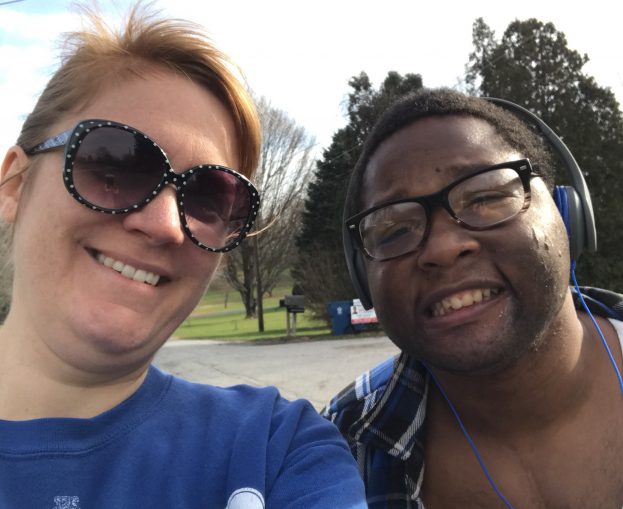As the director of ABA Services, Kristin McCoy leads assessment and treatment for children with autism through Applied Behavior Analysis. Kristin has been instrumental in helping shape Damar’s autism services. She holds a bachelor’s degree from DePauw University and a master’s degree from Nova Southeastern University, as well as her Board Certified Behavior Analyst (BCBA) distinction.
Sensory Sensitive Experiences
3 minute read
A child at an Indianapolis Colts game gets a weighted blanket and headphones. A family at the Children’s Museum of Indianapolis gets a map with sensory-aware markings. Kids at an Indianapolis park can spend time in a sensory room with a range of autism-friendly activities.
Not so long ago, such accommodations would have been unthinkable. Today, they’re more common, as attractions discover how important it is to offer experiences that can be enjoyed by children with a range of intellectual and developmental abilities.
In Central Indiana, a number of institutions and attractions have embraced these or similar concepts to provide accommodations. Here are some examples:
- Bankers Life Fieldhouse has partnered with New York-based Kulture City to provide a “sensory-inclusive” environment. This means facility staff have been trained to recognize guests with sensory needs and to provide them with “sensory bags,” which include such items as noise-canceling headphones, fidget tools and weighted lap pads.
- The Children’s Museum of Indianapolis offers similar accommodations, including a sensory map that lets parents know about areas that are sensory-heavy and those that would be less stimulating. A variety of symbols highlight such issues as lighting, noise levels and even smells that could be beneficial or upsetting to a child with special needs. In addition, the museum provides small “kits” with fidget toys, roller toys and more, as well as quiet rooms where families can go, if necessary.
- Chuck E. Cheese offers Sensory-Sensitive Sundays, where they open two hours early for sensory-sensitive guests. During those early-open periods, crowds will be smaller, music will be at lower volume, and there will be fewer visual stimuli. In Indianapolis, this service is available at the 8804 South US 31, location.
- Conner Prairie opens an hour early to accommodate the needs of children with autism and other special needs and also offers a guide for parents of children with special needs, including a sensory-friendly “Tip Sheet.”
- The Indianapolis Colts do indeed offer weighted blankets and headphones, as well as picture menus to accommodate children and adults with special needs.
- IndyParks’ southwest-side Rhodius Park recently opened a sensory room with a dozen special activities including swings, a ball pit and a rock wall. It is particularly designed to help children calm down and enjoy a quiet place. The room is open Monday through Friday from 4-8 p.m., and Saturday from 10 a.m. until 2 p.m. The cost is $3 per child.
- A few area parks have features especially designed for children with autism and other behavioral and developmental disabilities. For example, Freedom Trail Park in Westfield includes spinning and twirling features as a result of developers’ work with the Hamilton County Autism Support Group in designing the park. In addition, Independence Park in Greenwood features a sensory area with 20 different elements designed to engaged children with autism.
- Movie theaters are offering an increasing number of options for sensory-sensitive guests, usually meaning films are shown with the lights up and sound turned down. AMC Theaters, Regal Cinemas and Goodrich Quality Theaters are among the chains that feature sensory-sensitive showings, and Studio Movie Grill and the Hamilton 16+IMAX also offer special screenings for sensory-sensitive guests. Contact specific theaters for details about when they offer the special showings.
As more and more attractions recognize this trend, what should parents of children with special needs do to ensure a good experience for their families? Here are a few tips:
- We certainly haven’t listed every attraction that offers accommodations, and some organizations that don’t have programs in place might be interested in offering them. If there’s somewhere you’d like to take your child, call and ask if they can make accommodations. Even if they can’t now, your call might encourage them to think about what they can do in the future.
- Call ahead. Make sure any advertised accommodations will be available when you visit.
- Don’t expect perfection. Even with the best programs, things won’t always go smoothly. Be forgiving if something isn’t perfect, but politely point out any problems you see.
- Come prepared. Even if an attraction is prepared for your child’s visit, that doesn’t mean you shouldn’t prepare for the outing like you would any other. Bring along anything your child might need to feel comfortable enough to enjoy himself or herself.
- Collaborate with other parents. One parent alone might not get an attraction to make accommodations, but a group of parents working with an attraction to make improvements might succeed.
- Give feedback. Let attractions that do accommodate your child know that you appreciate what they’ve done, and offer real examples of the ways you child enjoyed the visit. And, sure, if you have constructive criticism, share it. But, most of all, say thanks.





